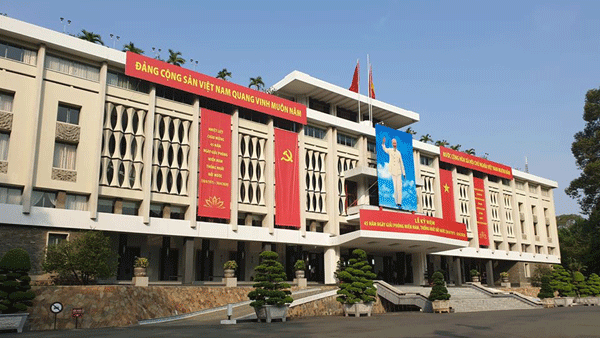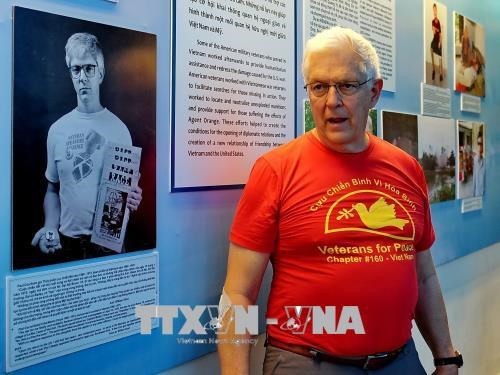 Ho Chi Minh city's Reunification building is decorated with red flags and a picture of President Ho Chi Minh (Photo: VOV) Ho Chi Minh city's Reunification building is decorated with red flags and a picture of President Ho Chi Minh (Photo: VOV) |
B: Today, we’d like to acknowledge the participation of Mr. Vincentiu Daniel Gheorghe of Romania. In an email to VOV this week, he sent us his entry and expressed his interest in our contest and programs.
A: He said he likes “Vietnamese Music”, the ”Sunday Show”, and the ”Letter Box” best because they play interesting Vietnamese music and explore many interesting cultural traditions, historical site, and tourist destinations. He said he is very interested in the music and culture of Vietnam, which he called “an amazingly charming country”.
B: Reading his contest entry, we found that he knows Vietnam quite well and closely follows developments in Vietnam. He seems to have a particular interest in Vietnam’s natural landscape.
A: Thank you, Mr. Gheorghe for participating in our contest. Here’s hoping your love for Vietnam and knowledge of the country will win you a trip to Vietnam.
B: The 6 contest questions and contest rules are posted on our website at vovworld.vn. Look for them in the “Letter Box” or “About Us” section.
A: By listening to our programs regularly and reading the stories on our website, you can easily find the answers to all 6 contest questions. Sharing your own stories about Vietnam and your own thoughts about VOV will add bonus points to your score.
B: The contestants who submit the 3 best entries will win a free 5-day trip to Vietnam. Good luck to you all!
A: This week, we received many greetings on Vietnam’s National Reunification Day, April 30th. We’d like to thank Maria Khanam Moure, Faria Khanam Mumu, HM Tarek, and Saif Ahmed Utsha of Bangladesh for the greetings they sent us on this special day.
B: This year, we’re celebrating the 45th anniversary of the Liberation of the South and National Reunification. The Spring General Offensive and Uprising of 1975, which culminated in the historic HCM campaign, brought an end to the American War and marked yet another milestone in Vietnam’s long history of resisting foreign invaders.
A: The 1975 victory ended a 21-year war and 117 years of colonialism, and opened a new era of national unity, independence, and socialism in Vietnam.
B: The sacrifices of southern farmers supported by soldiers from northern Vietnam for the southern front won one victory after another, leading to the liberation of Saigon at the end of April, 1975. At 11:30 on April 30 a victory flag was raised on the roof of the Independence Palace.
A: These days, what is now called Reunification Palace in what is now called Ho Chi Minh City is one of Vietnam’s most popular tourist destinations. Reunification Palace has been recognized as a special national relic for its historical and architectural values.
B: Reunification Palace, originally called Norodom Palace, stands in Nam Ky Khoi Nghia street surrounded by a large shady park. It was built by the French between 1868 and 1873 and named for King Norodom I of Cambodia.
A: It was rebuilt in 1962 by order of Ngo Dinh Diem, the first President of the Saigon regime. It was designed by Ngo Viet Thu, the first Vietnamese architect to win the Prix de Rome. The building is a harmonious blend of modern French architecture and traditional oriental architecture. Shaped like the Chinese character for "good luck", it covers an area of 12 hectares and has three main floors, two mezzanines, a basement, and a terrace.
A: At 11:30 on April 30, 1975, the flag of the South Vietnam National Liberation Front floated above the roof of the palace. The building stills remains exactly as it was 45 years ago. Tanks 843 and 390 of the Vietnam People's Army, the first to enter the courtyard of the palace, are still there, intact.
B: In November, 1975, the palace hosted the Political Consultative Meeting on reunifying north and south Vietnam. Following this meeting, the palace was renamed Reunification Palace. In 1976, the palace was recognized as a special historical relic. The palace now receives thousands of tourists every day.
A: We hope you’ll visit Reunification Palace in Ho Chi Minh City when you visit Vietnam.
B: Maria Khanam Moure of Bangladesh listened to our program on May 1st and expressed interest in our story about museums in Vietnam. A museum we’d like to introduce to you today is the War Remnants Museum in HCMC, another place you should visit to learn about Vietnam’s national liberation struggle.
 At the War Remnants Museum, Veteran Paul Cox stands next to his own picture taken when he took part in a campaign supporting peace for Vietnam. He fought in Vietnam in 1969-1970. (Photo: VNA) At the War Remnants Museum, Veteran Paul Cox stands next to his own picture taken when he took part in a campaign supporting peace for Vietnam. He fought in Vietnam in 1969-1970. (Photo: VNA) |
A: The museum was once an electronics maintenance center for the US army and the Saigon regime. On September 4, 1975, Ho Chi Minh City turned the center into an exhibition of US crimes. 20 years later it became the Museum of War Remnants, which has collected and preserved photos and other items related to recent wars in Vietnam. The museum celebrates the Vietnamese people’s glorious victories in the national struggles for independence.
B: The Museum of War Remnants, listed among the world’s top 10 museums by the US travel site TripAdvisor, preserves more than 20,000 artifacts, films, and documents. Most of its exhibits feature the American War and the first Indochina War against French colonialists. The museum welcomes more than 500,000 visitors a year.
A: After listening to our program on May 1st, Craig Jordan of the US expressed his interest in our story about the Vietnam National Fine Arts Museum launching an online exhibition of paintings and sculptures by artists who were on the battlefield or in Ho Chi Minh City on April 30, 1975, and witnessed firsthand the historic moment of Vietnam’s independence and reunification.
B: Mr. Jordan asked for the museum’s web address. The address is vnfam.vn. There’s also a Vietnam National Fine Arts Facebook page.
A: Commenting on our April 30 broadcast, Jordan wrote: “I especially appreciated the report on relations with the US. I marked my calendar to listen to the broadcast on Reunification Day. The interviews, nostalgic revolutionary songs and discussion did not disappoint. The 45th anniversary is a key year and it must have been disappointing not to be able to celebrate through social gatherings.”
B: He continued: “I was a child/teenager growing up during the war and remember the nightly news of destruction and death in Vietnam broadcast during our dinner time. It was a depressing period. However, we are all very blessed that our two countries have made a commitment to leave the past behind and think forward in our relationship. Today I see Vietnamese people, culture and cuisine within my community. I have lived long enough to see our relations come full circle. That is true joy.”
A: Thank you, Mr. Jordan, for sharing your thoughts with us and for tuning in to VOV. We’ll send you a QSL card to confirm your report.
A: We welcome your feedback at: English Service, VOVworld, the Voice of Vietnam, 45 Ba Trieu street, Hanoi, Vietnam. Or you can email us at our new email address: englishsection@vov.vn. You’re invited to visit us online at vovworld.vn, where you can hear both live and recorded programs. Good bye!